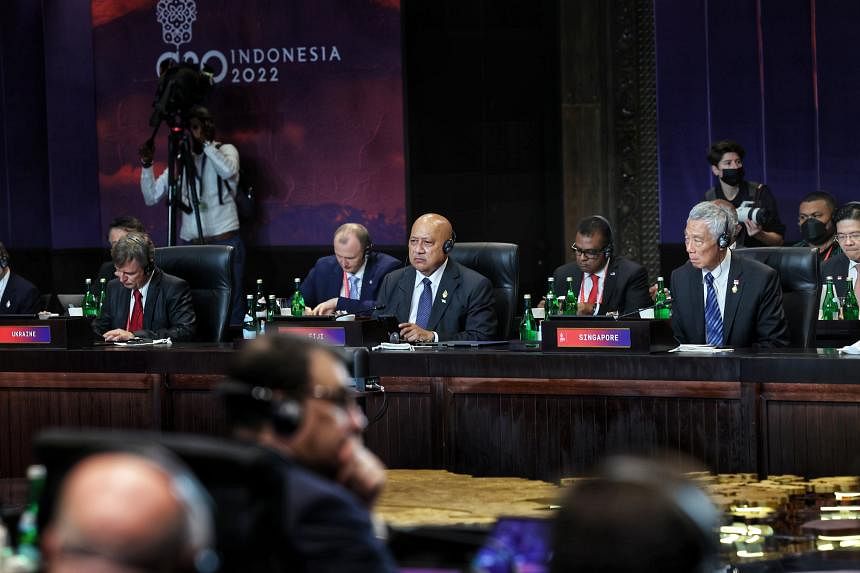G-20 summit: PM Lee calls for open supply chains and for countries to accelerate net-zero ambitions

Prime Minister Lee Hsien Loong at a session on food and energy security at the Group of 20 Leaders’ Summit in Bali on Nov 15, 2022. PHOTO: MCI

Lim Min Zhang
Assistant News Editor
PUBLISHED
15 NOV 2022, 4:04 PM SGT
FacebookWhatsAppTwitter
NUSA DUA, Indonesia – The rules-based multilateral trading system needs to be strengthened so that all countries can continue to enjoy unimpeded access to energy, food and agricultural commodities, especially during crises, Prime Minister Lee Hsien Loong said on Tuesday.
Speaking on food and energy security at the Group of 20 (G-20) Leaders’ Summit in Bali, he said Singapore takes its role as a trusted hub for logistics, transportation and energy very seriously.
“We look forward to working with partners to keep global supply chains free and open,” he said at the annual gathering of the world’s largest economies, which takes place as rising protectionism, geopolitical tensions and Russia’s ongoing war in Ukraine impact the world economy.
Singapore is not a member of the G-20, but is regularly invited to attend its meetings as the convenor of the Global Governance Group, or 3G, an informal grouping of 30 small and medium-sized members of the United Nations. PM Lee is participating in the two-day summit at the invitation of the G-20 chairman, Indonesian President Joko Widodo.
This year’s summit at the Apurva Kempinski Bali hotel is themed Recover Together, Recover Stronger. Many leaders took the opportunity to hold bilateral meetings a day after United States President Joe Biden met Chinese President Xi Jinping. On Tuesday, Mr Xi met Australian Prime Minister Anthony Albanese, and Mr Biden met Indian Prime Minister Narendra Modi, among others.
Indonesia is leading discussions on global economic recovery, digital transformation and climate change, among other topics.
PM Lee said that as a small island-state which imports most of its food and energy, Singapore has an acute understanding of the importance of maintaining access to food and energy sources. Waves of Covid-19 and the Ukraine war have worsened the global situation on both fronts, which was already compromised by extreme weather, post-pandemic global demand and export restrictions.

Get tips to grow your investments and career in weekly newsletter
Sign up
By signing up, you agree to our Privacy Policy and Terms and Conditions.
He also offered two other suggestions: Accelerate net-zero ambitions, with climate change being the longer-term threat to food and energy security, and scale up sustainable financing.
Singapore is systematically working towards reaching its target of net-zero by 2050, said PM Lee, noting that the Republic is raising carbon taxes significantly.
It will also implement a national hydrogen strategy to green its power sector, and is working with regional partners to develop the Asean Power Grid – an initiative to enhance regional energy links and security while supporting decarbonisation efforts.
Countries will also need more transition finance to help hard-to-abate sectors decarbonise or switch to green energy, he added. For example, the Asian Development Bank’s Energy Transition Mechanism is facilitating the early retirement of coal-powered plants.
Private capital should be mobilised too, he added. The Monetary Authority of Singapore is injecting seed capital into an Asia Climate Solutions Design Grant to provide funding for studies on blended finance solutions. These typically combine investment from a philanthropic or government entity with a commercial investment.
What is the G-20 and which leaders are attending the Bali summit?
G-20: Xi urges wealthy nations to reduce fallout from rate hikes
“It is just one example of how we can encourage private-sector participation in sustainable infrastructure projects,” he said.
World leaders who spoke called for an end to the war in Ukraine. Indonesian President Joko Widodo said: “We must not allow the world to fall into another Cold War.” Mr Modi said there was a need to find a way to return to “the path of ceasefire and diplomacy”, and urged countries not to restrict energy supplies.
Ukrainian President Volodymyr Zelensky, who delivered a virtual address, outlined a series of conditions needed to end the war, while British Prime Minister Rishi Sunak drew attention to the absence of Russian President Vladimir Putin, who did not show up for the summit and is represented by his Foreign Minister Sergei Lavrov.
PM Lee, who is accompanied by Deputy Prime Minister Lawrence Wong and Foreign Minister Vivian Balakrishnan, met World Trade Organisation director-general Ngozi Okonjo-Iweala, as well as the prime ministers of Spain and the Netherlands on Tuesday.
PM Lee and his Spanish counterpart Pedro Sanchez discussed deepening collaboration on digitalisation and developing smart cities, said PM Lee’s press secretary Chang Li Lin. He and Dutch PM Mark Rutte exchanged views on regional and global developments, including the war in Ukraine, Sino-US relations and its implications for the region



